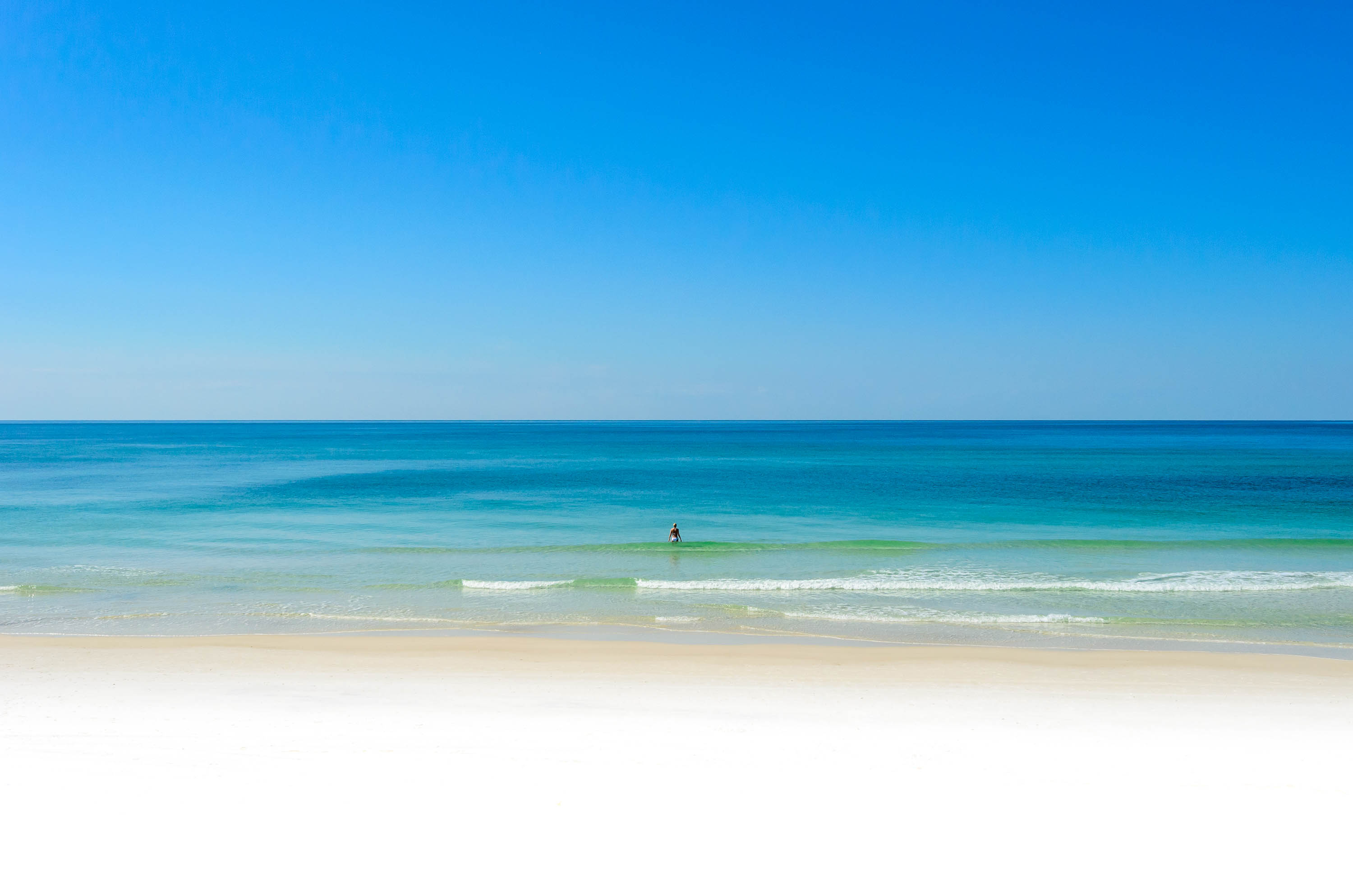'Field of Schemes: If you build it, they won't come': St. Joe under scrutiny
January 17, 2011 8:39 PM
Florida Freedom Newspapers
To respected Wall Street analyst David Einhorn, the value of St. Joe Co.?s land holdings is best illustrated as a tale of two developments.
?Management loves to show investors WaterColor, but WaterColor is 90 percent developed and 80 percent sold,? said Einhorn, a hedge fund manager for Greenlight Capital Inc. who runs a $4.02 billion portfolio, during an Oct. 13 presentation to the Value Investing Congress.
But a few miles down scenic Walton County Road 30A resides another St. Joe Co. residential development with a different sales record. In the presentation, titled ?Field of Schemes: If you build it, they won?t come,? Einhorn described the Towns of WaterSound ? WaterSound Beach, WaterSound West Beach and WaterSound ? as ghost towns and more representative of what?s being purchased when an investor buys St. Joe stock.
WaterSound only has interior lots left, many of which are on the north side of U.S. 98 where there is little demand, Einhorn wrote.
?The best stuff has sold,? Einhorn wrote. ?Many developments are ghost towns and little value remains.?
Einhorn?s presentations have drawn a lot of attention ? from investors, journalists, and now the Securities and Exchange Commission (SEC).
According to a document St. Joe filed last week with the SEC, regulators are conducting an informal inquiry into the company?s ?policies and practices concerning impairment of investment in real estate assets.?
St. Joe Co. officials are not commenting on the SEC inquiry but cited the filing, which states, ?St. Joe intends to cooperate fully with the SEC in connection with the informal inquiry.? They also stressed the SEC is conducting an inquiry ? not an investigation ? and the filing was voluntary.
The mission of the SEC is to protect investors, maintain fair, orderly and efficient markets, and facilitate capital formation. Informal SEC inquiries sometimes lead to a full investigation, which would be conducted confidentially and not become public record until the SEC files an action in court or in its internal administrative process.
Regardless of the inquiry?s outcome, news of the SEC?s interest added to the Wall Street speculation about the company?s finances and future.
?Competitive advantage?
Not everyone agrees with Einhorn?s assessment, including other prominent investors, and St. Joe officials are trying to reassure investors that they are a company with sound finances and solid growth potential.
During a quarterly conference call in early November, St. Joe Co. President and CEO Britt Greene highlighted the company?s ?flexible balance sheet? that, coupled with the vast land holdings on the company?s balance sheet, lays the groundwork for the company?s success for decades to come.
The company?s holdings and balance sheet have drawn praise from others on Wall Street.
?St. Joe?s wide competitive advantage is simply its near-zero cost land,? investor Christopher Pavese wrote in a July investment presentation about St. Joe.
Pavese oversees a fund valued around $1 billion for the Broyhill Asset Management group that purchased shares of St. Joe last summer following the Deepwater Horizon oil spill.
A crucial piece of the St. Joe Co.?s development plans includes work on the West Bay sector in Bay County, currently one of the largest master planned projects in Florida. The 50-year master plan includes 75,000 acres, 37 million commercial square feet, 27,000 residential units, 490 hotel rooms, two marinas with 900 slips and 39,000 conservation acres.
?St. Joe is a long-term story that may very well take years or decades to fully play out,? Pavese wrote.
Pavese called St. Joe stock undervalued because the company carries 41,000 entitled acres at under $50,000 per acre, assigning zero value to the company?s remaining 536,000 acres. ?Entitled? refers to land that has gone through the pre-construction process of getting land use approved and obtaining permits and utility easements.
?We are the majority landowner that can provide for the region?s growing commercial and residential needs,? Greene told investors on a November earnings call. ?Additionally, most competitors of ours must acquire land at market price, entitle it and build amenities to compete against us. ? It is a competitive advantage for St. Joe that we have several communities with developed products ready for sale that prospective buyers can see.?
Pavese also pointed out the company has ample cash, virtually no interest-bearing debt, a leaner cost structure, has outsourced management of hotels and resorts to third-party operators and has sold assets.
St. Joe, which trades under the ticker symbol JOE, also sold a little more than 17 million shares of stock at $35 per share in 2008 to eliminate its outstanding debt.
?JOE is not a one-trick seahorse,? Pavese wrote. ?The company works rigorously to strengthen its competitive position by partnering with the state and fostering strong relationships with all of the counties where it owns land.?
Value
How much St. Joe?s land is worth depends on whom you ask, and it?s the subject of the SEC inquiry.
?Valuation is an imperfect science at best,? Pavese said in his presentation.
Einhorn told investors he assigned a value of between $643 million to $965 million for the 536,000 rural, undeveloped acres of St. Joe land. He speculated as to what the company?s remaining 41,000 acres of entitled land is worth, considering Florida has been one of the hardest hit housing markets during the recession.
?Despite making huge investment ahead of the bust, JOE has taken only modest write-downs,? according to the Einhorn presentation.
Einhorn pointed to a ?development deep dive? using statistics from WaterSound and WindMark in Gulf County, which have 24 percent and 10 percent of the planned units sold, respectively.
Pavese countered that Einhorn?s calculations assign the value to the company?s timber holdings, but neglects to take into account the entitled land, which is more valuable.
?Einhorn?s 180-page presentation had tons of bells and whistles,? Pavese said. ?The economic conditions are already in the stock prices. The presentation was nothing but show.
?Einhorn values the stock at $7 to $10 per share based on the value of timber. ? Eighty percent of the company is the worth of timber, but he is ignoring the 20 percent that is worth much more.? St. Joe stock closed Friday at $25.26.
Broyhill Asset Management has an in-house staff of accountants that have looked over St. Joe?s books, Pavese said.
?It is not black and white,? he said. ?From an accounting perspective future cash flows are important even if there are assets that need to be written down.?
Wall Street speculation
After Einhorn spoke out about St. Joe, the fate of the company became the subject of Wall Street speculation.
?Real estate development has not had a positive return even if the financials are correct,? Einhorn wrote.
To recoup some losses, St. Joe filed suit against Halliburton, M-I SWACO and Transocean, saying the Deepwater Horizon oil spill caused as much as a 40 percent decline in the company?s stock price. It?s one of many companies in the Panhandle that sued after the spill.
But that didn?t sit well with Einhorn.
?JOE sues for damages while advertising to the public the beaches are wonderful,? Einhorn wrote in the presentation.
Many St. Joe lots were sold to speculators during the real estate boom, and when the boom ended, business essentially stopped, Einhorn said.
Einhorn recommended that management sell the company, but said that could prove difficult because the stock price is too high.
?JOE?s highest and best use is to return to its?roots as a rural land company,? Einhorn wrote. ?The rural land is worth $650 to $950 million or $7 to $10 per share. There is a modest additional value for the 41,000 entitled acres.?
The Broyhill group predicts the value of St. Joe stock will remain around $20 a share with $15 being the lowest. Pavese speculated last week that St. Joe might be purchased or taken private following a Wednesday SEC filing by the St. Joe Co. board of directors that allows Bruce Berkowitz?s Fairholme Capital to acquire more than 30 percent of the company?s stock, effective immediately.
Berkowitz recently has been working to recapitalize private distressed properties.
?The likelihood (Berkowitz) will make a bid for this company increased dramatically,? Pavese said. ?If I?m Bruce Berkowitz, the company is almost better in private hands. There are four managers that own 60 percent of shares. It would only take 40 percent more to take the rest private.?
January 17, 2011 8:39 PM
Florida Freedom Newspapers
To respected Wall Street analyst David Einhorn, the value of St. Joe Co.?s land holdings is best illustrated as a tale of two developments.
?Management loves to show investors WaterColor, but WaterColor is 90 percent developed and 80 percent sold,? said Einhorn, a hedge fund manager for Greenlight Capital Inc. who runs a $4.02 billion portfolio, during an Oct. 13 presentation to the Value Investing Congress.
But a few miles down scenic Walton County Road 30A resides another St. Joe Co. residential development with a different sales record. In the presentation, titled ?Field of Schemes: If you build it, they won?t come,? Einhorn described the Towns of WaterSound ? WaterSound Beach, WaterSound West Beach and WaterSound ? as ghost towns and more representative of what?s being purchased when an investor buys St. Joe stock.
WaterSound only has interior lots left, many of which are on the north side of U.S. 98 where there is little demand, Einhorn wrote.
?The best stuff has sold,? Einhorn wrote. ?Many developments are ghost towns and little value remains.?
Einhorn?s presentations have drawn a lot of attention ? from investors, journalists, and now the Securities and Exchange Commission (SEC).
According to a document St. Joe filed last week with the SEC, regulators are conducting an informal inquiry into the company?s ?policies and practices concerning impairment of investment in real estate assets.?
St. Joe Co. officials are not commenting on the SEC inquiry but cited the filing, which states, ?St. Joe intends to cooperate fully with the SEC in connection with the informal inquiry.? They also stressed the SEC is conducting an inquiry ? not an investigation ? and the filing was voluntary.
The mission of the SEC is to protect investors, maintain fair, orderly and efficient markets, and facilitate capital formation. Informal SEC inquiries sometimes lead to a full investigation, which would be conducted confidentially and not become public record until the SEC files an action in court or in its internal administrative process.
Regardless of the inquiry?s outcome, news of the SEC?s interest added to the Wall Street speculation about the company?s finances and future.
?Competitive advantage?
Not everyone agrees with Einhorn?s assessment, including other prominent investors, and St. Joe officials are trying to reassure investors that they are a company with sound finances and solid growth potential.
During a quarterly conference call in early November, St. Joe Co. President and CEO Britt Greene highlighted the company?s ?flexible balance sheet? that, coupled with the vast land holdings on the company?s balance sheet, lays the groundwork for the company?s success for decades to come.
The company?s holdings and balance sheet have drawn praise from others on Wall Street.
?St. Joe?s wide competitive advantage is simply its near-zero cost land,? investor Christopher Pavese wrote in a July investment presentation about St. Joe.
Pavese oversees a fund valued around $1 billion for the Broyhill Asset Management group that purchased shares of St. Joe last summer following the Deepwater Horizon oil spill.
A crucial piece of the St. Joe Co.?s development plans includes work on the West Bay sector in Bay County, currently one of the largest master planned projects in Florida. The 50-year master plan includes 75,000 acres, 37 million commercial square feet, 27,000 residential units, 490 hotel rooms, two marinas with 900 slips and 39,000 conservation acres.
?St. Joe is a long-term story that may very well take years or decades to fully play out,? Pavese wrote.
Pavese called St. Joe stock undervalued because the company carries 41,000 entitled acres at under $50,000 per acre, assigning zero value to the company?s remaining 536,000 acres. ?Entitled? refers to land that has gone through the pre-construction process of getting land use approved and obtaining permits and utility easements.
?We are the majority landowner that can provide for the region?s growing commercial and residential needs,? Greene told investors on a November earnings call. ?Additionally, most competitors of ours must acquire land at market price, entitle it and build amenities to compete against us. ? It is a competitive advantage for St. Joe that we have several communities with developed products ready for sale that prospective buyers can see.?
Pavese also pointed out the company has ample cash, virtually no interest-bearing debt, a leaner cost structure, has outsourced management of hotels and resorts to third-party operators and has sold assets.
St. Joe, which trades under the ticker symbol JOE, also sold a little more than 17 million shares of stock at $35 per share in 2008 to eliminate its outstanding debt.
?JOE is not a one-trick seahorse,? Pavese wrote. ?The company works rigorously to strengthen its competitive position by partnering with the state and fostering strong relationships with all of the counties where it owns land.?
Value
How much St. Joe?s land is worth depends on whom you ask, and it?s the subject of the SEC inquiry.
?Valuation is an imperfect science at best,? Pavese said in his presentation.
Einhorn told investors he assigned a value of between $643 million to $965 million for the 536,000 rural, undeveloped acres of St. Joe land. He speculated as to what the company?s remaining 41,000 acres of entitled land is worth, considering Florida has been one of the hardest hit housing markets during the recession.
?Despite making huge investment ahead of the bust, JOE has taken only modest write-downs,? according to the Einhorn presentation.
Einhorn pointed to a ?development deep dive? using statistics from WaterSound and WindMark in Gulf County, which have 24 percent and 10 percent of the planned units sold, respectively.
Pavese countered that Einhorn?s calculations assign the value to the company?s timber holdings, but neglects to take into account the entitled land, which is more valuable.
?Einhorn?s 180-page presentation had tons of bells and whistles,? Pavese said. ?The economic conditions are already in the stock prices. The presentation was nothing but show.
?Einhorn values the stock at $7 to $10 per share based on the value of timber. ? Eighty percent of the company is the worth of timber, but he is ignoring the 20 percent that is worth much more.? St. Joe stock closed Friday at $25.26.
Broyhill Asset Management has an in-house staff of accountants that have looked over St. Joe?s books, Pavese said.
?It is not black and white,? he said. ?From an accounting perspective future cash flows are important even if there are assets that need to be written down.?
Wall Street speculation
After Einhorn spoke out about St. Joe, the fate of the company became the subject of Wall Street speculation.
?Real estate development has not had a positive return even if the financials are correct,? Einhorn wrote.
To recoup some losses, St. Joe filed suit against Halliburton, M-I SWACO and Transocean, saying the Deepwater Horizon oil spill caused as much as a 40 percent decline in the company?s stock price. It?s one of many companies in the Panhandle that sued after the spill.
But that didn?t sit well with Einhorn.
?JOE sues for damages while advertising to the public the beaches are wonderful,? Einhorn wrote in the presentation.
Many St. Joe lots were sold to speculators during the real estate boom, and when the boom ended, business essentially stopped, Einhorn said.
Einhorn recommended that management sell the company, but said that could prove difficult because the stock price is too high.
?JOE?s highest and best use is to return to its?roots as a rural land company,? Einhorn wrote. ?The rural land is worth $650 to $950 million or $7 to $10 per share. There is a modest additional value for the 41,000 entitled acres.?
The Broyhill group predicts the value of St. Joe stock will remain around $20 a share with $15 being the lowest. Pavese speculated last week that St. Joe might be purchased or taken private following a Wednesday SEC filing by the St. Joe Co. board of directors that allows Bruce Berkowitz?s Fairholme Capital to acquire more than 30 percent of the company?s stock, effective immediately.
Berkowitz recently has been working to recapitalize private distressed properties.
?The likelihood (Berkowitz) will make a bid for this company increased dramatically,? Pavese said. ?If I?m Bruce Berkowitz, the company is almost better in private hands. There are four managers that own 60 percent of shares. It would only take 40 percent more to take the rest private.?












